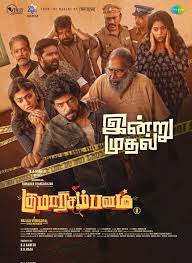
Kumaara Sambavam Movie Review: A Refreshing Dose of Clean Comedy in Kollywood
In an era where Tamil cinema is flooded with high-octane action thrillers, star-studded masalas, and heavy-duty dramas, Kumaara Sambavam arrives like a breath of fresh air. Directed by Balaji Venugopal, who previously helmed the quirky Lucky Man (2023), this 2025 release marks a delightful return to the roots of situational comedy. Starring debutant Kumaran Thangarajan in the lead, alongside Payal Radhakrishna, Elango Kumaravel, Bala Saravanan, G.M. Kumar, Vinod Sagar, and Livingston, the film blends humor, mild suspense, and a touch of social commentary into a compact 2-hour package. Released on September 12, 2025, just two days ago, it's already generating buzz for its old-school charm and laugh-out-loud moments. If you're tired of the usual noise, this one might just be the antidote you've been waiting for.
The story revolves around Kumaran (Kumaran Thangarajan), an aspiring filmmaker scraping by with odd jobs while dreaming of his big break. Desperate for funds, he convinces his grandfather (G.M. Kumar) to sell their old family home. Complicating matters is the upstairs tenant, Varadharajan (Elango Kumaravel), a hyperactive social activist who files lawsuits over everything from noisy neighbors to perceived environmental injustices. Their constant bickering sets the tone for a farce that's equal parts annoying and amusing. Things take a dramatic turn when Varadharajan is found dead in suspicious circumstances, thrusting Kumaran under police scrutiny. With his girlfriend Priya (Payal Radhakrishna) by his side, Kumaran must navigate a web of quirky suspects, nosy cops, and family secrets to clear his name. What unfolds is a "people-in-rooms" comedy, confined mostly to the house, where doors slam, accusations fly, and misunderstandings pile up like laundry.
Balaji Venugopal's screenplay is the real star here. He smartly avoids the over-the-top slapstick that plagues many Tamil comedies, opting instead for a rhythm-based humor that's subtle yet effective. The first half takes its time setting up the characters and conflicts, which might feel a tad slow if you're expecting instant gratification. We get glimpses into Kumaran's frustrated ambitions—think endless script rejections and awkward investor pitches—and Varadharajan's eccentric activism, like protesting against "inauspicious" construction noises. It's here that the film nods to the "filmmaker within a film" trope, with Kumaran's dream project mirroring the chaos around him. But patience pays off; the second half explodes into a riot of silliness, with Balaji channeling the spirit of Crazy Mohan's plays. Scenes like the police interrogation turning into a comedy of errors, or the grandfather's deadpan interventions, had the theater audience in splits.
Performances elevate the material significantly. Kumaran Thangarajan, making his lead debut, brings a natural, understated comic timing that's refreshingly free of exaggeration. He starts off a bit too serious, embodying the wide-eyed dreamer, but loosens up in the latter portions, delivering punchlines with perfect deadpan delivery. Payal Radhakrishna shines as the supportive yet sassy Priya, providing a nice contrast to Kumaran's bumbling energy—her exasperated reactions to his schemes are gold. But the film's MVP is undoubtedly Elango Kumaravel as Varadharajan. He infuses the role with a manic energy that's quietly hilarious; even in flashbacks or imagined sequences, his character's nuisance factor lingers like a bad neighbor's complaints. G.M. Kumar adds warmth as the grandfather, avoiding sentimentality while stealing scenes with his sly wit. The supporting cast, including Bala Saravanan as a bumbling cop and Vinod Sagar as a suspicious handyman, chips in with spot-on timing, creating an ensemble that's greater than the sum of its parts. Livingston's cameo as a pompous lawyer is brief but memorable, reminding us why he's a comedy staple.
Technically, Kumaara Sambavam is solid without being flashy. Cinematographer Jagadeesh Sundaramurthy does wonders with the single-location setup, framing the house in ways that heighten the claustrophobic comedy—tight shots during arguments make the space feel alive and chaotic. Achu Rajamani's score is playful, nudging the pace along with quirky motifs, though a few musical cues feel forced and could have been trimmed. The editing keeps things brisk post-interval, ensuring the mystery doesn't drag into thriller territory. Balaji wisely tones down the suspense, focusing on the farce; the "reveals" are soft and serve the laughs more than the plot twists. One minor gripe: the film occasionally dips into preachiness about superstition vs. science or blind faith, but it never overdoes it, weaving these themes lightly into the humor.
What makes Kumaara Sambavam stand out in 2025's crowded slate is its commitment to clean, family-friendly comedy. In a landscape dominated by double entendres and crude jokes, this film's self-aware silliness feels like a throwback to the golden era of Tamil humor—think *Michael Madana Kama Rajan* or *Avvai Shanmughi*, but updated for modern sensibilities. It pokes fun at aspiring artists, overzealous activists, and bureaucratic red tape without malice, leaving you with a warm, fuzzy feeling. Sure, the concept isn't groundbreaking—the "locked-room mystery" with comedic suspects has been done before—but Balaji executes it with such charm that novelty takes a backseat to enjoyment.
In the end, *Kumaara Sambavam* isn't trying to reinvent the wheel; it's content being a well-oiled laughter machine. At a time when Kollywood is experimenting with 'hatke' content like *Coolie* or *Bad Girl*, this film reminds us that sometimes, simple stories told with heart and humor are all we need. Head to the theaters if you're up for a light-hearted outing—it's worth the ticket for the smiles it guarantees.
Rating: 3.5/5.







